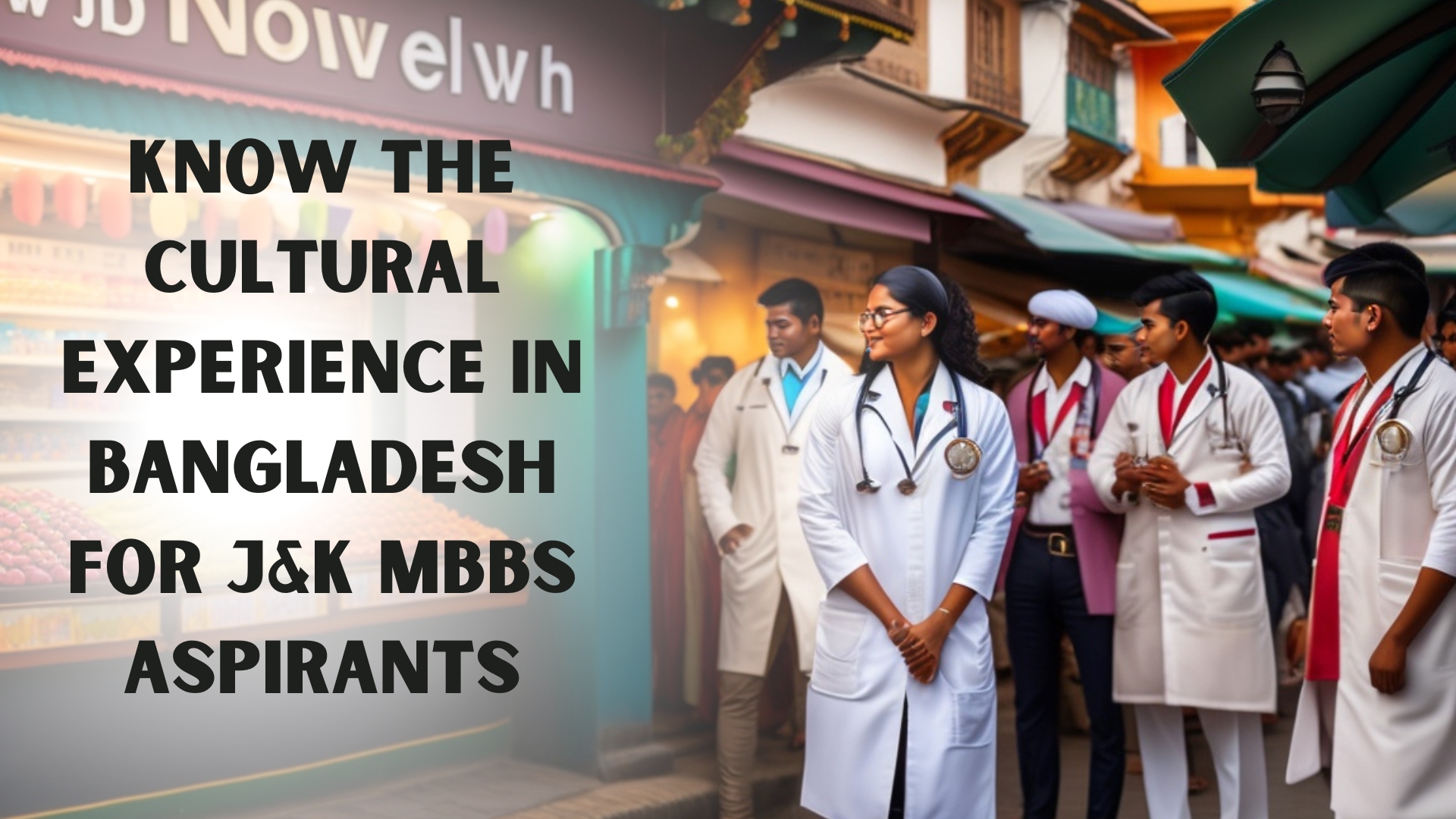Experience a thrilling journey through Bangladesh’s vibrant culture while studying medicine! Jammu & Kashmir aspirants can hone their medical skills at renowned institutions while also exploring the country’s unique traditions. Curriculums in these institutions integrate cultural aspects, deepening students’ understanding of how it affects healthcare.
Outside the classrooms, students can discover the diverse culture of Bangladesh. From traditional festivals to mouthwatering cuisine, every aspect of life here is steeped in unique customs. By embracing these customs, aspiring doctors can develop empathy and adaptability that will serve them well when treating future patients.
Bangladesh is recognized by UNESCO as one of the world’s most culturally diverse countries. With over 160 million people belonging to various ethnic groups and practising different religions, it provides an ideal setting to appreciate cultural nuances in the field of medicine.
So, buckle up and get ready to explore the cultural rollercoaster that is Bangladesh, where medicine and cultural immersion collide in an unforgettable experience!
Table of Contents
The Cultural Landscape of Bangladesh
The rich cultural tapestry of Bangladesh adds depth and dimension to the experience of studying medicine in this country. By immersing yourself in Bangladesh’s cultural landscape, you not only gain medical knowledge but also develop a deeper understanding of the interconnectedness between culture and medicine.
The Cultural Landscape of Bangladesh:
| Aspects | Know In-Depth |
|---|---|
| Language | Bengali is the primary language spoken in Bangladesh, with English widely used in academic and professional settings. |
| Religion | Islam is the predominant religion, influencing various aspects of society, including healthcare practices and rituals. |
| Festivals | Bangladesh celebrates a range of vibrant festivals, such as Eid ul-Fitr, Pahela Baishakh, and Durga Puja, providing insights into the traditional customs and rituals of the people. |
| Arts and Crafts | Traditional art forms, such as Nakshi Kantha (embroidered quilt), Jamdani (handloom weaving), and Terracotta sculpture, showcase the country’s artistic heritage and skills. |
| Cuisine | Bengali cuisine, with its flavorful spices, unique preparations, and emphasis on seafood, offers a culinary exploration as students indulge in local dishes like biryani, shorshe ilish, and pitha. |
| Social Customs | The culture of respect, hospitality, and close-knit communities in Bangladesh shapes the way medical professionals interact with patients and their families. |
Covering unique details, let’s dive deeper into the cultural landscape of Bangladesh.
The country has a distinct musical tradition, with genres like Baul and Rabindra Sangeet resonating deeply with the local population. The influence of these genres in healthcare settings is noteworthy, as music therapy plays a significant role in addressing emotional well-being and healing.
Delving into history, Bengal has a rich literary legacy, producing renowned scholars and writers like Rabindranath Tagore and Kazi Nazrul Islam. Literature, poetry, and storytelling contribute to the cultural identity of Bangladesh and have shaped the mindset of its people.
Overall, the cultural landscape of Bangladesh holds tremendous significance in the realm of medicine and offers a unique avenue for Jammu & Kashmir aspirants to broaden their understanding of healthcare practices within a diverse and vibrant society.
From ancient healing practices to modern medical breakthroughs, Bangladesh’s rich cultural tapestry weaves together a fascinating journey through the history and traditions of medicine.
History and Traditions
Bangladesh’s history dates back thousands of years. Dynasties and empires have contributed to its culture, with traditions passed down through generations. Music, dance and art forms are still thriving today.
Bangla literature is unique. Poets, writers and intellectuals have left a lasting mark, both locally and globally. Literary works range from love and spirituality to social issues.
The craftsmanship of handloom textiles is remarkable. Bangladesh is renowned for intricate designs and exquisite fabrics. Skilled artisans use traditional methods, with artistic prowess handed down through generations.
To experience the essence of Bangladesh, visit during a colourful festival. Pohela Boishakh or Durga Puja offer lively celebrations. You’ll find vibrancy in every aspect of Bangladeshi culture. Artistic prowess and musical melodies will have you shimmying and shaking!
Art and Music
Art and music in Bangladesh present its vibrant cultural heritage. They are strong expressions of stories, emotions, and bonds.
Traditional art forms such as Nakshi Kantha (embroidery) and Jamdani (weaving) are renowned for their intricate craftsmanship. Rabindra Sangeet is an example of Bengali classical music, celebrating the works of revered poet Rabindranath Tagore. Manipuri dance brings graceful movements and vibrant costumes together, creating a captivating visual experience.
The Dhaka Art Summit is an annual event that invites celebrated artists from all over the world. It’s a platform for artistic exchange and collaboration.
Visiting the National Art Gallery in Dhaka is a great way to learn about Bangladesh’s art scene. There, one can explore a variety of contemporary and traditional artworks. To witness the mastery of Bengali classical musicians, attending a live performance at the Chhayanaut Music Complex is also a great option.
By embracing both traditional and modern forms of art and music, visitors can relish the cultural richness of Bangladesh. It’s so full of life – no disco ball needed!
Festivals and Celebrations
Bengali New Year, also known as “Pohela Boishakh,” starts the Bengali calendar. People celebrate with cultural programs, traditional food, and colourful processions.
Muslims celebrate Eid-ul-Fitr to mark the end of Ramadan. Families exchange gifts, visit mosques, and enjoy delicious feasts.
During Durga Puja, Hindus worship Goddess Durga. Rituals, decorations, and lively processions line the streets.
The Bishwa Ijtema gathering in Tongi is one of the world’s largest Muslim congregations. People come from all over for spiritual enrichment and blessings.
Victory Day celebrates Bangladesh’s independence from Pakistan in 1971. Cultural events and parades honour those who sacrificed in the liberation war.
Other festivals like Saraswati Puja, Baishakhi Mela, and Poush Mela show Bangladeshi culture.
The ‘Shakrain Festival’ involves kite flying competitions in Dhaka every year. This tradition began over two centuries ago and engages people of all ages.
Cuisine in Bangladesh is so delicious; it’s like a magical sauce made from unicorn tears!
Cuisine and Food Culture
Cuisine in Bangladesh has a rich and diverse food culture. Flavours are vibrant, spices are aromatic, and ingredients are always fresh. Here’s a table of traditional dishes and their descriptions:
| Traditional Dishes | Attributes |
|---|---|
| Biryani | Rice cooked with meat/veg, flavoured with saffron and spices. |
| Kacchi Biriyani | Raw marinated meat between partially cooked rice slow-cooked on low flame. |
| Fish Curry | Fish in a spicy gravy of tomatoes, onions and spices, served with rice. |
| Pitha | Traditional rice cakes, sweet or savoury, for festivals & weddings. |
| Hilsa Fry | Hilsa fish marinated, fried till crisp – a seafood delicacy. |
Mustard oil is a distinctive cooking oil used in Bangladesh due to its flavour profile. This adds a unique taste to fish curry and veg preparations. Regional specialities like Roshgolla (sweet cottage cheese balls) from Kolkata or Fuchka (spicy street snacks) from Dhaka are must-tries. Bangladesh’s cuisine offers a delightful experience for locals and visitors alike!
Studying Medicine in Bangladesh
Studying Medicine in Bangladesh provides a unique opportunity to gain not only medical knowledge but also immerse oneself in the rich cultural landscape of the country. Here is an informative and formal exploration of this topic:
Studying Medicine in Bangladesh offers a culturally immersive experience parallel to the pursuit of medical knowledge. By delving into Bangladesh’s cultural landscape, medical students are able to gain a comprehensive understanding of how culture influences medicine.
Table: Studying Medicine in Bangladesh
| Aspects | Data |
|---|---|
| Curriculum | Aligned with global standards |
| Clinical Exposure | Ample opportunities for practical learning |
| Faculty | Highly experienced and qualified |
| Facilities | State-of-the-art medical infrastructure |
| Language | English-medium programs available |
| Affordability | Cost-effective education compared to other countries |
Exploring beyond the academic aspects, a study journey in Bangladesh exposes students to unique cultural experiences. This includes interacting with local communities, participating in cultural festivities, and understanding the traditional healthcare practices intertwined with modern medicine.
One remarkable historical aspect of studying medicine in Bangladesh is the country’s contribution to global healthcare. Bangladesh has produced renowned physicians and researchers who have made significant contributions to medical advancements worldwide.
With a medical education system as diverse as Bangladesh’s cultural landscape, studying medicine here is like embarking on a thrilling cultural safari.
Medical Education System in Bangladesh
In Bangladesh, medical education is renowned for its thoroughness and practical approach. Students undergo a rigorous curriculum that combines theoretical knowledge with hands-on training. This comprehensive approach equips graduates with the skills they need to excel in their medical careers.
The curriculum includes basic sciences, clinical practice, laboratory work, hospital rotations, and community-based experiences. This immersive learning environment allows students to get practical experience early and gain a deeper understanding of the healthcare system.
The medical education system in Bangladesh puts an emphasis on community medicine. Students learn how to tackle health issues on a population level and recognize the social determinants of health. This holistic approach prepares them to become empathetic physicians who can effectively address healthcare challenges in diverse communities.
The success of the medical education system in Bangladesh is evident in the growing number of internationally-recognized professionals. Many graduates have made significant contributions in their fields, both locally and abroad. Their expertise and dedication are an inspiration for future generations of medical students.
Overall, studying medicine in Bangladesh provides students with a comprehensive education that combines theoretical knowledge with practical experience. This balanced approach prepares them to become competent and compassionate healthcare professionals.
Benefits of Studying Medicine in Bangladesh
There are many perks of studying medicine in Bangladesh, making it an appealing option for medical hopefuls! Check out these advantages:
| Quality Education | Bangladesh is known for its renowned medical universities, providing globally recognized degrees and high-grade education. |
|---|---|
| Affordability | Compared to Western countries, the expense of studying medicine in Bangladesh is notably lower, making it a cost-effective choice for international students. |
| Multicultural Environment | With a diverse student population from various nations, studying medicine in Bangladesh provides a multicultural learning experience, encouraging global perspectives and networking chances. |
| Advanced Facilities | Medical universities in Bangladesh are stocked with modern technologies and state-of-the-art facilities, offering students hands-on practice and training. |
| Experienced Faculty | Renowned professors and experienced faculty members guide students throughout their academic journey, guaranteeing comprehensive knowledge and aptitude growth. |
| Clinical Exposure | Students studying medicine in Bangladesh obtain valuable clinical exposure through internships at well-known hospitals, boosting their practical skills and prepping them for real-world circumstances. |
In addition, Bangladesh is devoted to continuous improvement in medical education and focuses on research, further increasing the benefits of studying medicine there. This country has a longstanding history of ancient healing practices and medical advancement. The many success stories of graduates who have achieved in their medical careers after completing their studies there only affirm the positive impact of picking Bangladesh as the ideal destination for studying medicine.
Challenges and Opportunities
Studying Medicine in Bangladesh brings both challenges and opportunities. Let’s take a closer look at them.
Competition for limited seats, language barrier for international students, limited research opportunities and lack of adequate funding for research are a few of the challenges.
At the same time, there are opportunities like quality medical education at an affordable price, exposure to diverse medical conditions and practices, access to modern infrastructure and technology, extensive practical training through clinical rotations and a supportive community of fellow medical professionals.
Bangladesh also offers unique advantages such as a rich cultural heritage during educational pursuits and a commitment to providing quality healthcare.
The country has become a valuable contributor to global medical research. An example of this is the International Centre for Diarrhoeal Disease Research, Bangladesh.
To experience Bangladesh’s culture, remember that studying medicine here means learning to diagnose and treat your own mosquito bites.
Interested in Studying Medicine in Bangladesh?
Immerse yourself in the rich cultural experience of Bangladesh while pursuing your MBBS dreams. SA Visa Central offers educational consultation, study visa support, and post-departure assistance with an office in Dhaka.
- Educational Consultation: Get expert guidance on studying medicine in Bangladesh.
- Study Visa Support: Simplify your visa application process with our assistance.
- Post-Departure Assistance: Our Dhaka office provides support during your stay in Bangladesh.
Discover the extraordinary blend of education and culture. Connect with us for more information and start your journey today!
Explore Studying Medicine in Bangladesh with SA Visa Central.
Immersing Yourself in Bangladesh’s Culture
Immersing Yourself in the Cultural Tapestry of Bangladesh
When exploring the cultural landscape of Bangladesh while studying medicine, students can indulge in a rich and transformative experience. Discovering Bangladesh’s culture not only enhances their understanding of medicine but also broadens their global perspective.
Embracing the Cultural Journey
Immersing oneself in Bangladesh’s vibrant culture offers aspiring medical professionals a unique opportunity to witness the interplay between culture and medicine. By participating in local traditions, festivals, and rituals, students can gain insights into how cultural beliefs and practices shape healthcare in Bangladesh.
Unveiling Unique Details
Delving deeper, students can explore the close-knit community dynamics and the strong emphasis on family in Bangladeshi culture. This provides them with a broader understanding of the social support systems that influence healthcare decision-making. Additionally, they can also witness the unique ways traditional healing practices coexist with modern medicine in this diverse nation.
Cultural Exchange Programs
Participants engage in language exchanges, learning Bangla and sharing their own mother tongues. Visits to local communities give a glimpse into the daily lives of Bangladeshi people, promoting cross-cultural understanding. Workshops on traditional arts and crafts teach ancient techniques that have been passed down through generations. Cultural performances showcase Bangladesh’s vibrant music, dance, and theatre traditions. Home-stay experiences offer an immersive cultural experience with local families. Volunteer opportunities let participants give back to the community by participating in social projects.
To further understand the country, Cultural Exchange Programs also include visits to UNESCO World Heritage sites like the Sundarbans and Somapura Mahavihara. An example of this was in 2009 when students from Bangladesh and Japan collaborated on a traditional art project. This collaboration fostered lasting friendships and promoted cultural exchange between the two nations.
Learning Local Language and Customs
To fully appreciate Bangladesh’s culture, learning the language and customs is a must. Understand the language, and you can have meaningful conversations with locals. This allows you to experience the heritage and traditions of this vibrant country.
Mastering Bangla enables you to navigate daily life effortlessly. Listen to the unique sounds of the language, and soon enough, you can express yourself fluently.
To understand the culture, you must embrace their customs. The people of Bangladesh take pride in traditions passed down for generations. Participate in traditional festivals and religious ceremonies to get insights into their values and beliefs. Embracing customs shows respect and admiration for the culture.
Getting familiar with etiquette is also essential in Bangladesh. Politeness and respect are valued, so learn the appropriate behaviours when visiting someone’s home or attending social gatherings. Small gestures like removing your shoes before entering a house or offering your right hand for greetings can make a good impression.
Learning language and customs is more than gaining knowledge; it’s about embracing a new way of life. It opens windows to diverse perspectives and broadens your horizons. Connect with locals on a deeper level – it’s an unforgettable experience. Get involved in community activities in Bangladesh, and you’ll blend in quickly.
Participating in Community Activities
- Volunteer! Teach English, help with environmental projects or assist in local healthcare initiatives.
- Celebrate! Holi, Eid al-Fitr and more – there’s always something happening!
- Learn traditional crafts, music, dance and cooking at cultural workshops.
- Interact with locals, indulge in street food and watch local sports tournaments at community events.
- Make friends and gain knowledge of the local way of life.
Did you know? Bangladesh has over 1500 rural libraries. Organizations like The Hunger Project ensure access to books for villagers.
Interacting with Locals and Healthcare Professionals
In Bangladesh, to get to know the culture, it’s important to connect with locals and healthcare professionals. Show respect for the customs and values, and learn some basic Bengali phrases. Locals will be pleased to share their stories and traditions with open-minded people.
Interacting with healthcare professionals gives a deeper understanding of health and well-being in the country. Observe their work and talk with them to gain valuable knowledge.
Traditional medicine is a big part of healthcare here. Kabirs use herbal remedies and spiritual practices to treat illnesses. This fusion of ancient wisdom and modern medicine makes Bangladesh unique.
Do you think laughter is the best medicine? Find out for yourself – the doctors here have a great sense of humour!
The Intersection of Culture and Medicine
The intersection of culture and medicine can be observed in the unique and intricate relationship between these two fields. Cultural beliefs, values, and practices greatly influence the way medicine is practised and experienced in different parts of the world. Understanding the cultural aspects of medicine is crucial for healthcare professionals, as it helps in providing culturally-sensitive and effective care to patients.
In this section, we will explore how culture and medicine intersect by examining various aspects that are influenced by cultural factors.
Table: The Intersection of Culture and Medicine
| Aspect | Cultural Influence |
|---|---|
| Beliefs and Attitudes | Cultural beliefs shape individuals’ beliefs about health and illness. These beliefs influence the way people seek medical treatment and the types of treatment they prefer. |
| Communication | Cultural norms and values affect the way healthcare professionals communicate with patients, including language barriers, non-verbal cues, and the importance of family involvement. |
| Traditional Medicine | Many cultures have traditional healing practices and remedies that are deeply rooted in their history and are still widely practiced alongside modern medicine. |
| Ethical Considerations | Cultural values and norms influence ethical decision-making in medicine, such as end-of-life care, organ transplantation, and reproductive health issues. |
| Health Disparities | Cultural factors contribute to disparities in healthcare access, delivery, and outcomes, highlighting the need for culturally sensitive healthcare interventions. |
It is important for healthcare professionals to have a deep understanding of these cultural influences to provide patient-centred care that respects and integrates cultural beliefs and practices. By recognizing and appreciating the diversity of cultural perspectives on health and medicine, healthcare providers can enhance the quality of care and patient outcomes.
Conclusion
Medical students from Jammu & Kashmir can explore Bangladesh’s unique cultural tapestry while studying medicine. Spices, textiles, music, dance – there’s no end to the immersive experiences available! Engaging with locals gives insight into healthcare practices. Modern medicine is also thriving here, with top-notch facilities.
Bangladesh has a historical significance in medicine. Pioneers like Dr Muhammad Yunus have made huge contributions. Studying here allows aspiring doctors to walk in their footsteps and shape healthcare’s future globally. A transformative and enlightening experience awaits!
FAQs
Ques 1. What is the significance of cultural immersion while studying medicine in Bangladesh?
Ans 1. Cultural immersion in Bangladesh is highly valuable for Jammu & Kashmir aspirants studying medicine as it offers a unique opportunity to understand the country’s rich traditions, customs, and beliefs. By immersing yourself in the local culture, you not only enhance your medical knowledge but also develop a deeper appreciation for cultural diversity, enabling you to become a more compassionate and culturally sensitive healthcare professional.
Ques 2. How can I experience the cultural journey in Bangladesh while studying medicine?
Ans 2. To experience a cultural journey in Bangladesh while studying medicine, you can actively engage in various cultural activities, such as participating in local festivals, exploring historical landmarks, visiting museums, and interacting with the local community. Embracing the food, arts, music, and traditions of Bangladesh will provide you with a holistic experience of the country’s unique cultural landscape.
Ques 3. How does Bangladesh’s culture influence medicine in the country?
Ans 3. Bangladesh’s culture plays a significant role in shaping the practice of medicine in the country. Traditional healing systems, such as Ayurveda and Unani medicine, coexist alongside modern medical practices, providing a diverse healthcare system. By immersing yourself in the culture, you will gain a deeper understanding of the beliefs and practices that influence healthcare decisions and patient care in Bangladesh.
Ques 4. Are there any specific cultural aspects students should be aware of while studying medicine in Bangladesh?
Ans 4. Yes, there are certain cultural aspects that students should be aware of while studying medicine in Bangladesh. Respect for elders, maintaining personal space, and being mindful of cultural norms regarding dress and behaviour are important. Being open-minded, adaptable, and willing to learn from local healthcare practitioners and patients will help you navigate and appreciate the cultural nuances during your medical studies.
Ques 5. What makes studying medicine in Bangladesh an adventurous experience?
Ans 5. Studying medicine in Bangladesh offers an adventurous experience due to the country’s diverse topography, historical sites, vibrant festivals, and warm hospitality. From exploring the lush countryside to visiting ancient archaeological ruins, you can immerse yourself in the adventurous side of Bangladesh while pursuing your medical education, creating unforgettable memories along the way.
Ques 6. How can I discover and appreciate the local culture while studying medicine in Bangladesh?
Ans 6. To discover and appreciate the local culture while studying medicine in Bangladesh, engage in local community events, join cultural clubs or organizations, learn the local language, try traditional cuisine, and interact with locals through volunteering opportunities. By actively participating and embracing the cultural intricacies, you will enrich your medical studies with a deep appreciation for Bangladesh’s cultural heritage.








